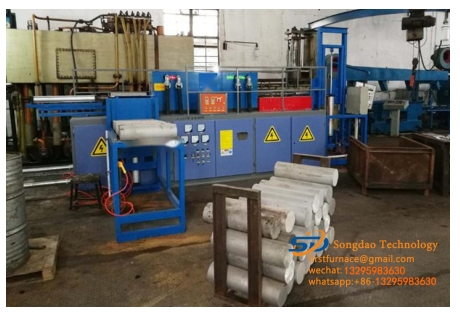- 05
- Aug
How to choose an aluminum rod heating furnace?
တစ်ခုရွေးချယ်နည်း အလူမီနီလှံတံကိုအပူပေးမီးဖိုထဲ?
1. First of all, the heating temperature of aluminum rods is generally lower than 500 degrees. The allowable forging temperature range of aluminum alloys is very narrow. The design of aluminum rod heating furnaces does not need to use high temperature resistant refractory linings. The wall thickness of aluminum rod heating furnaces is 2-3mm. , Leave a gap of 15-20mm when rolling, and clamp the cushion block made of refractory material along the gap. Considering that the stainless steel lining expands to the feed end after being heated, only the discharge end of the lining is fixed.
2. The guide rail of the aluminum rod heating furnace is an arc-shaped guide plate made of 2-3mm thick austenitic stainless steel plate. The guide plate usually adopts two sections with different lengths: the short section is fastened to the end plate at the feed end, and the long section of the guide plate fastened to the discharge end is pressed.
3. The outer surface of the lining of the aluminum rod heating furnace is wrapped with a 1mm thick organosilicon mica plate and a 5mm thick high alumina aluminum silicate fiber.
4. The length of the aluminum rod heating furnace should be designed considering the influence of the end effect. By adjusting the position of the travel switch of the pushing machine, the distance between the discharge end of the aluminum rod and the discharge port of the inductor should be kept more than 100mm. If the distance is too small, the temperature of the end will decrease; if it is too large, the end of the aluminum alloy will be oxidized at high temperature and the surface will blister.
5. The length of the aluminum rod heating furnace should be reasonably designed. Since the forging temperature of the aluminum rod is close to the critical temperature, the length of the inductor cannot be designed too long. Whether the sensor is too long, whether it is heated continuously or step by step, it may cause the temperature of the aluminum billet to be over-burned.

